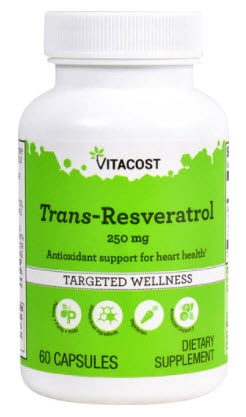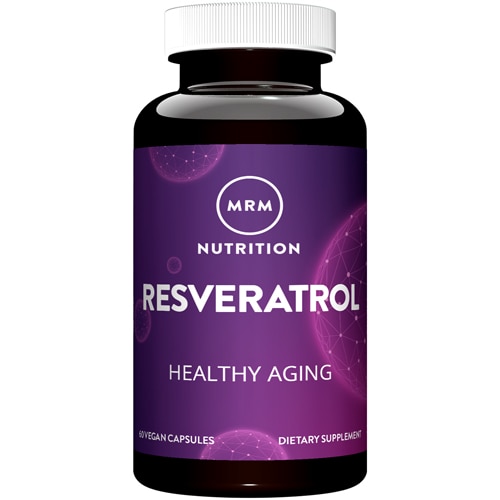The
Mediterranean Diet has become one of the most popular eating regimes in the last decade, in large part because it’s flexible and delicious. What’s more, experts frequently rate the diet
the healthiest in existence, thanks to its concentration on plant-based foods such as olive oil, fruits, vegetables and nuts. Also at the core of this beloved diet? Moderate amounts of
red wine.

This is due to the fact that red wine is rich in
resveratrol, a compound found not only in your merlots and sangioveses but also in
mulberries, purple and red grapes, and peanuts. Revered for its health-boosting properties, resveratrol has become ubiquitous—so much so it’s now featured in everything from skincare to nutritional supplements. In fact, data from Future Market Insights reveals that resveratrol supplements brought in $49 million in 2019 alone and is expected to rise eight percent before we reach 2028. Why? Because resveratrol has been linked to a host of health benefits, including helping to protect cardiovascular health.
†
Interested? Here’s the low-down on one of the most enticing compounds around.
What is resveratrol?
Some science for you: Resveratrol is what’s known as a “stilbenoid polyphenol.” Polyphenols are naturally produced by plants as a defensive mechanism against unwanted invaders and environmental stressors, such as ultraviolet radiation, drought, fungal infections and pathogens. (Consider it, then, a plant’s own immune system.) In a nifty trick of nature, when consumed by humans, polyphenols act as
“reducing agents” and, in concert with other nutrients like vitamin C and carotenoids, protect
our bodies against harm.
What are some resveratrol benefits?
One of the biggest boons of resveratrol is that it’s a natural antioxidant for cardiovascular health—a crucial part of well-being but one of the largest public health concerns today. As an antioxidant, resveratrol functions at a cellular level to help keep you safe from free radical damage. In fact, research published in the 2016 journal of
Nutrients showed that resveratrol was able to scavenge free radicals and prevent oxidative stress, which is at the heart of several diseases. Additionally, resveratrol organically supports cardiovascular health, period, in part by helping to generate more nitric oxide—a natural gas that encourages the blood vessels to relax.
†
What are some dietary sources of resveratrol?
In addition to red wine, purple and red grapes, mulberries and peanuts, Harvard Health reports that resveratrol is found in a bevy of foods and beverages, including white wine,
pistachios,
cocoa, blueberries, cranberries and—let’s hear a round of applause—
dark chocolate. Other experts state that it’s also present in plums, pomegranate, grape tomatoes and raspberries.
If you can’t get enough resveratrol from these eats, consider, with your doctor’s approval, resveratrol supplements (which, we should add, are taken by one of the most renowned early researchers on resveratrol, Harvard professor of genetics, Dr. David Sinclair).
Vitacost’s Trans-Resveratrol, for example, contains 500 mg of exactly what its name describes—the biologically active form of resveratrol, trans-resveratrol, which is the most studied resveratrol isomer. Suitable for vegetarians, this supplement offers the benefits of red wine—minus the sugar, alcohol and potential hangover.
What are the side effects of resveratrol supplements—and what else do I need to know?
According to the September 2018 issue of
Biomedicines, resveratrol does not appear to have “debilitating or toxic side effects.” An excess of resveratrol, however, might cause stomach upsets such as nausea, vomiting, or diarrhea. Further, resveratrol may have negative interactions with certain medications, particularly blood thinners.
In addition, because resveratrol is considered a phytoestrogen, in that it mimics estrogen in the body, some experts suggest that those with hormone-driven cancers, such as ovary and breast cancer, should avoid resveratrol (all the more reason to get your health professional’s approval before supplementing with resveratrol).
And if you do get the green light? Take the dosage recommended—and, like those from the Mediterranean, savor the benefits of this excellent natural compound.
†These statements have not been approved by the Food and Drug Administration. These products are not intended to diagnose, treat, cure or prevent disease.
Featured product:

 This is due to the fact that red wine is rich in resveratrol, a compound found not only in your merlots and sangioveses but also in mulberries, purple and red grapes, and peanuts. Revered for its health-boosting properties, resveratrol has become ubiquitous—so much so it’s now featured in everything from skincare to nutritional supplements. In fact, data from Future Market Insights reveals that resveratrol supplements brought in $49 million in 2019 alone and is expected to rise eight percent before we reach 2028. Why? Because resveratrol has been linked to a host of health benefits, including helping to protect cardiovascular health.†
Interested? Here’s the low-down on one of the most enticing compounds around.
This is due to the fact that red wine is rich in resveratrol, a compound found not only in your merlots and sangioveses but also in mulberries, purple and red grapes, and peanuts. Revered for its health-boosting properties, resveratrol has become ubiquitous—so much so it’s now featured in everything from skincare to nutritional supplements. In fact, data from Future Market Insights reveals that resveratrol supplements brought in $49 million in 2019 alone and is expected to rise eight percent before we reach 2028. Why? Because resveratrol has been linked to a host of health benefits, including helping to protect cardiovascular health.†
Interested? Here’s the low-down on one of the most enticing compounds around.




